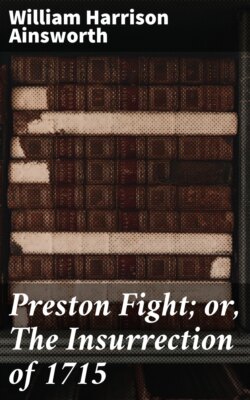Читать книгу Preston Fight; or, The Insurrection of 1715 - William Harrison Ainsworth - Страница 22
На сайте Литреса книга снята с продажи.
XV.—A GENERAL DEPARTURE.
ОглавлениеTable of Contents
A BRIGHT day dawned on Dilston. Fair looked the garden with its lawn and terrace, inviting those within the mansion to stroll forth and enjoy the freshness of the morn. So calm and still was all around that the rippling of the hidden burn could be distinctly heard in the deep glen. Within the park, beyond the old grey bridge that linked it with the grounds, the deer could be seen couched beneath the oaks. The neighbouring woods, the dark moorland in the distance, over which hung a thin mist, the river glistening here and there through the trees—all completed a picture which was seen by more than one of the earl's guests, and often recalled by them.
The prince was amongst those who brushed the dew from the lawn, and gazed at the charming prospect. He likewise attended matins in the little chapel.
As he was returning from the service with Lord Der-wentwater, he met Colonel Oxburgh, and was struck by the grave expression of his countenance.
“Good morrow, colonel,” he said, returning the other's military salute. “I fear, from your looks, that you have some bad news to give me.”
“What I have to tell your majesty demands instant consideration and decision,” replied Oxburgh. “By some means or other, your arrival has been discovered by Sir William Lorraine, the high sheriff of the county, and yesterday afternoon he sent a spy here to make sure that he had not been misinformed. The fellow was suspected and locked up for the night, but it was only this morning that I forced him by threats to confess his errand. It is certain from what he says that the sheriff will come here with a strong party of men to secure your majesty's person.”
Lord Derwentwater looked aghast at this startling intelligence, but the prince did not seem much disturbed by it.
“Instant measures must be taken for the defence of the place,” said Lord Derwentwater.
“It cannot be defended, my lord,” rejoined Colonel Ox-burgh. “His majesty must not remain here.”
“Do you counsel flight, colonel?” said the prince.
“Not flight—but a retreat, my liege,” replied Oxburgh.
“No need to fly,” said Lord Derwentwater. “I will undertake to conceal his majesty from any search that can be made for him.”
“Better he should seek shelter in some fortified house or castle,” observed Oxburgh.
“But where?” demanded the prince. “Where would you have me go?”
“If your majesty will not remain here, and trust yourself to me, I advise you to go to Bamborough Castle,” said Lord Derwentwater.
“But is Forster to be relied on?” said the prince. “Is he thoroughly loyal?”
“I'll answer for him with my life,” said the earl.
“And so will I, my liege,” added Oxburgh.
“Then I'll trust him,” said the prince.
“Shall I acquaint him with your majesty's determination?” inquired the earl. “No time must be lost.”
“I'll go to him myself,” rejoined the prince.
“Ah! here he comes!” exclaimed Colonel Oxburgh.
As he spoke, Forster was seen descending the steps with Sir John Webb, and immediately obeyed a summons given him by the colonel.
He was as much alarmed as the others when he learnt the prince's jeopardy, and before his highness signified his intention, offered him an asylum at Bamborough.
It was then decided that the prince's departure should take place forthwith, and it was likewise arranged that Lord Derwentwater with Colonel Oxburgh and his troop should escort his highness.
Some further arrangements were subsequently made, but these were sufficient in the meantime, and Colonel Oxburgh and Forster hurried off to the stables to give directions about the horses, while the prince and Lord Derwentwater entered the house.
As soon as the prince's intended departure became known all was bustle and confusion. The news was quickly communicated to the ladies, who very soon came downstairs, and another consultation was held in the library.
What was to be done? Anne and Dorothy were determined not to be left behind. Since the prince was going to Bamborough, and Lord Derwentwater, and almost everybody else were going with him, they would go too. Both were such perfect equestrians that they could be trusted to keep up with the fugitives, while their spirit was equal to any unforeseen difficulty or danger that might arise. So the proposition was acceded to.
Then came a suggestion from Lady Webb, to the effect that she and Sir John should drive back to Bamborough. This was likewise adopted.
Preparations for a general start were then made at once. Trunks and valises were packed up. Riding-dresses donned, horses brought round, Sir John Webb's carriage got ready, and in less than half an hour the prince and a large party consisting of Lord Derwentwater and his betrothed, Tom Forster and his fair sister, Colonel Oxburgh and his companions, were speeding down the chestnut avenue, with the intent of shaping their course to Bamborough Castle, which they hoped to reach before night.
Some quarter of an hour later, Sir John Webb's great lumbering coach took the same route.
Charles Radclyffe was left in charge of Dilston, and empowered to act as he deemed best, in his brother's absence.
Hedgeley, the spy, was detained for some time after the prince's departure, and then liberated.
